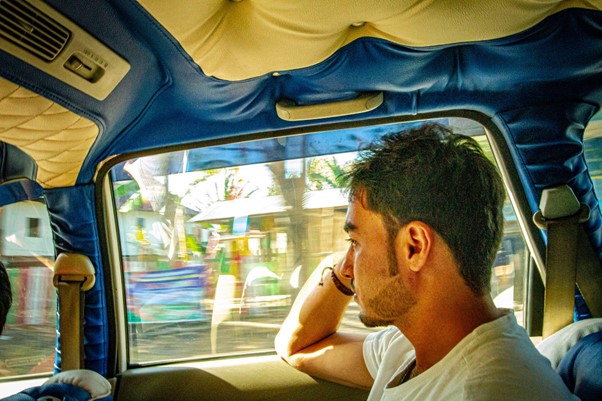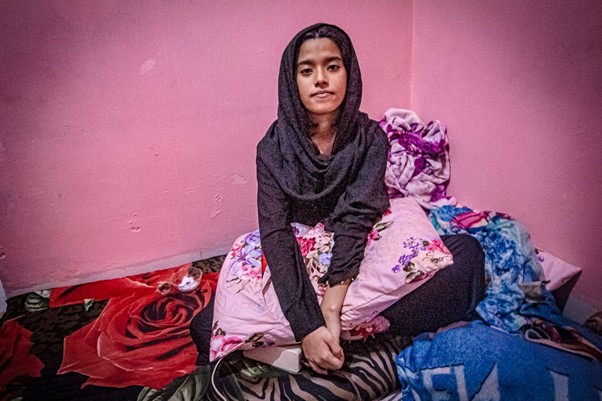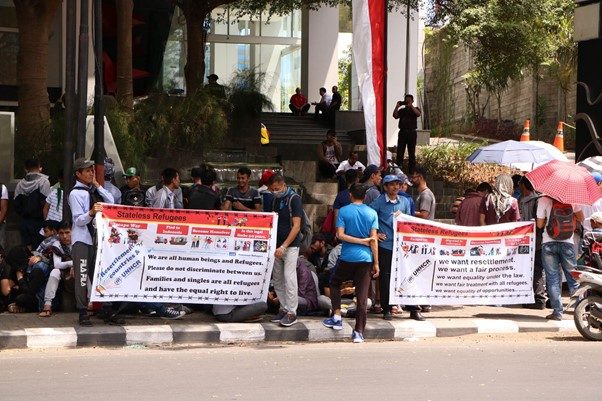There’s just under 14000 foreign refugees in Indonesia in 2021, more than half are from Afghanistan, the rest are made up of various countries and stateless peoples, particularly the Rohingya. Refugees in Indonesia have zero rights. They are not allowed to work, attend schools, drive vehicles, have restricted mobility and have very little self-agency. They are regarded officially as “illegal aliens” that are administered as subjects of UNHCR. Most refugees were detained in some sort of jail-like detention centre until 2019.
Obtaining visas and passports for most Indonesians is hard enough. It’s almost impossible to imagine fleeing one’s country. Upon recognising these disadvantages, for most Indonesians, and for members of the privileged diaspora like myself, the idea of people seeking asylum and becoming refugees is very foreign. Most Indonesians understand the idea of seeking refuge within their personal circumstances of fleeing natural disasters in their villages and cities. The idea that one has no choice but to leave their home nation entirely in order to seek safety and peace is something only very few Indonesians can relate to.
Thankfully nowadays, most refugees live in hostels in the community with various mobility restrictions or curfews. If they breach these, they face the penalty of being sent back to a (jail) detention centre. The refugee hostels and detention centres are run by Indonesia’s branch of the International Organisations for Migration (IOM) which is largely Australian funded. Once living in these community hostels, they are given a monthly stipend equivalent to AUD $125 per adult and AUD $50 per child.
Ilham Barab, has a Master of Public Administration from Flinders University and works as an Immigration Officer in Pekanbaru City, Indonesia. He has been working with refugees since 2014 and says that many Indonesian Officials are still stuck in an old mindset, perceiving dealing with foreign refugees as an international issue not an Indonesian one. There is a relatively small refugee population in Indonesia, unlike Malaysia and Thailand which have 12 and 10 times Indonesia’s foreign refugee population respectively. He admits that it is simply not Indonesia’s government priorities at this point.
“They still treat refugee issues through the lens of border security. Just like the management of the Indochinese refugees in the 1970s, they want security forces to manage their isolation from the rest of the community on an island where it is out of sight, out of mind from the rest of the country.” – Ilham Barab
And then there is the fate of refugees who live outside of IOM management. Most of these people have to fend for themselves. They are reliant entirely on their remaining savings, family support, and the goodwill of Indonesians or foreign NGOs to survive there.
Jokowi’s Presidential Decree and Indonesia’s commitment to the Non Refoulement Principle in the management of foreign refugees are the only legal mandates and guidelines that the country observes. However, each region and governor has a different interpretation of what these entail. Until 2013, Indonesia was exclusively seen as a transit country for refugees seeking to come to Australia (and New Zealand by extension) by boat. Since then, Operation Sovereign Borders been implemented, with less than 1% of refugees from Indonesia after 2018 being resettled annually to Australia (a download of UNHCR’s data in table format is available here) . This has created a protracted transit situation for refugees. They can no longer go back home due to ongoing threats of persecution, meanwhile their prospects of being reunited with family and friends and living peacefully in Australia is diminished due to its hard-lined border protection policies and cuts in our humanitarian program intake since the COVID-19 pandemic began have certainly worsened the situation.

Photo of Ashfaq, a Pakistani refugee – Courtesy of Freedom Street Documentary
“The Indonesian government does not spend a cent in managing its foreign refugee population. With Australia reducing the IOM funding, and the shrinking resettlement rates, the central government sooner or later will have to come to terms with managing the situation permanently. The central government has delegated their administrative tasks to regional areas which are then further pushed through to refugee accommodation management. This literally leaves the fate of refugees’ lives, like vaccination programs, freedom of movement, and their community engagement (or the lack thereof) in the hands of inexperienced individuals.” – Ilham Barab
Since the 2002 establishment of the Bali Process, in which Australia and Indonesia co-chaired 49 member countries, the region has solidified its efforts to combat illegal human trafficking, people smuggling, and other related transnational crimes. Though the premise now includes mandates on regional refugee processing, it lacks incentive for any sort of long-term solution, nor any directions advocating for integrating refugees with the local populations.
For Australians, a foreign refugee population close to 14000 is large. However, in the Indonesian and Southeast Asian context, it is miniscule. On average, there’s over 100,000 refugees stuck in either Malaysia or Thailand. Indonesia’s refugee population is comparable to a large neighbourhood population in Jakarta and most are spread across the archipelago.
At first, the small numbers might give the impression that this will be a good opportunity for integration efforts. In reality, the IOM and regional leaders in Indonesia have isolationist refugee management policies and a lack of political will, contributing to the invisibility of the issue. Understandably, there are simply more pressing domestic issues that affect a much larger local population.
But not all Indonesians are blind to this issue. Dr. Nino Viartasiwi is a Senior Researcher at the Resilience Development Initiative (Urban Refugee Research Group). The group has established research on the urban integration of refugees in the country, and is one of the few groups in Indonesia that actively promotes refugee integrations. According to Dr Viartasiwi, there’s little incentive amongst regional leaders for refugee integration.
“Refugees in different cities engaged differently with the local government and local citizens. In some cities such as Makassar, Pekanbaru and a few others, they receive good attention from the local government and the people. But in some other cities refugees still face lack of understanding from local citizens. Furthermore, most people within the local government still perceive foreign refugee matters as central government matters. Ultimately, the local government’s unwillingness to support integration efforts has triggered false perceptions and suspicion amongst the locals.” – Nino Viartasiwi

Photo of Joniad, a Rohingyan refugee – Courtesy of Freedom Street Documentary
Through Dr Viartasiwi and RDI UREF Team’s effort to facilitate conversations and programs with refugees, local government administrators, university students and other interested citizens, they have created a meaningful cross-cultural and geopolitical knowledge exchange. The refugees learn about living in Indonesia and the Indonesians learning about the wider context of refugees’ situation. Although still a long way from changing Indonesia’s narrative as a transit country, at least this is a good start. However, things have deteriorated since 2020.
“The COVID pandemic has limited our face-to-face programs, which reduces our refugee’s opportunity to tangibly interact and share their plights with more Indonesians. For most refugees in Indonesia, technology access is a challenge as most can’t afford to pay for laptops or even credit for their mobile internet data. Closed borders have also regressed a lot of the conversation about refugee migrations due to global public health concerns. I doubt that the current plight of Afghanistan will affect the conversation about acknowledging the presence of foreign refugees”. – Nino Viartasiwi
Dr Viartasiwi also noted that there are many false perceptions amongst Indonesians when refugees are protesting in front of UNHCR or IOM offices. The presence of hundreds or thousands of people cause security concerns among the public and the police. Most people are of course simply not aware that what these protestors are asking for is simply resettlement, or their rights being heard by these authorities. Their desperation for a long term solution and their deep sorrow in longing for a home is palpable.

Photo of Azizah, a stateless refugee – Courtesy of Freedom Street Documentary
Diah Tricesaria, from Community Engagement Focal Point for HOST International in Indonesia had extensively studied the state of mental health and community engagement amongst the refugee population across the country. From her findings, refugees not only find ways of coping through their mutual support from one another; for those who are quick enough to pick up the local language, they are able to find support amongst local Indonesians. But not all refugees find local Indonesians supportive.
“In more cosmopolitan or urbanised places like Jakarta, West Java and other wealthier regions where refugees are living more independently and are forced to interact with the locals, refugees experienced less discrimination and misunderstanding, particularly if they’re of the same faith. But what’s often not communicated enough are the stressors and the trauma refugees face prior to arriving in the country, which most Indonesians won’t be familiar with. But somehow, most eventually find their ways to bond, given the opportunity to mingle and as long as they don’t betray the trust of the locals.” – Diah Tricesaria
Besides research, Diah and her fellow colleagues and volunteers have helped many, mostly independent, refugees, connecting them with social organisations, opportunities, administration tasks, and potential donors. As positive as these efforts are, basic human rights and resettlement processes for refugees are still a long way away from being discussed by legislative and other governmental bodies.
“There’s a heavy emphasis on grassroots advocacy campaigns and support; local Indonesians and other global citizens themselves are the only people that are taking initiative. With miniscule political support from any governmental bodies, the only option is for us to calibrate our advocacy around these limitations. Ultimately, the fate of refugees in Indonesia will be dependent on the whims of global geopolitics.” – Diah Tricesaria
The future of foreign refugees spread across the archipelago is bleak. The COVID-19 pandemic has regressed many integration efforts and vaccination efforts have been scattered, as securing supplies to non-citizens is entirely reliant on UNHCR, not the Indonesian government.
Realising our civic responsibility in addressing a global issue in our part of the world is more important than ever.
This is where the film Freedom Street Documentary comes in. This film explores the big picture and history behind Australia’s hard line border protection policies, whilst looking closely at the plight of my three refugee friends, who are victims both of Indonesia’s indifference and Australia’s hard line border protection policies. The boats may have stopped, but Australia has designed a system of oppression towards refugees that has arguably outsourced its responsibilities to my home country of Indonesia. For pragmatic & meaningful change to occur on this issue, we must have need civic tools like this, that will enable advocates and change-makers to advance this discourse further.

Stars of the Documentary from Left to Right: Ashfaq, Joniad, Azizah and Alfred – Courtesy of Freedom Street Documentary
Freedom Street is an ongoing project, funded primarily through donations. Should you wish to donate, you can do so through the Documentary Australia Foundation (tax-deductible).
 Facebook
Facebook  Twitter
Twitter  Soundcloud
Soundcloud  Youtube
Youtube  Rss
Rss 